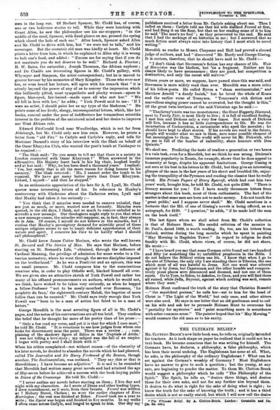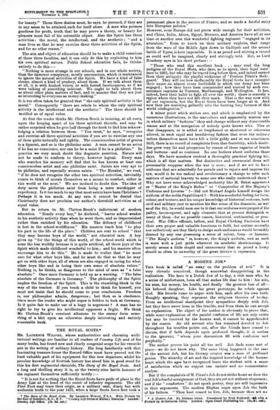THE ULTIMATE BELIEF.* Mn. Ctterrose-Baoca's new little book was, he
tells us, originally intended for teachers. As it took shape on paper he realized that it could not be a text-book. He became conscious that he was writing for himself. The Germans have, he declares, a philosophy, a false philosophy, which has boon their moral undoing. The Englishman has none at alL What, he asks, is the philosophy of the ordinary Englishman ? What can he set against the German's worship of Germany ? Most Englishmen have no answer to give to such a question ; but the young, at any rate, are beginning to ponder the matter. To them Mr. Clutton-Brook would suggest a philosophy which he calls " The Philosophy of the Spirit." The Spirit, he tells us, "desires three things, and desires these for their own sake, and not for any further aim beyond them. It &shoe to do what is right for the sake of doing what is right ; to know the truth for the sake of knowing the truth ; and it has a third desire which is not so easily stated, but which I will now call the desire • The (Minato Belief. By A. Hutton-Brock. London: Constable and Co. 12e. led. uet.1
for beauty." These three desires must, he says, be pursued, if they are in any sense to be attained, each for itself alone. A man who pursues goodness for profit, truth that he may prove a theory, or beauty for - pleasure must fail of his ostensible object. Also the Spirit has three activities : the moral, the intellectual, and the aesthetic ; " and a man lives so that he may exorcise these three activities of the Spirit, and for no other reason."
The aim and object of education should be to make a child conscious of these three faculties, and it can only do this by explaining to him his own spiritual nature. Public School education fails, he thinks, entirely to do this :-
"Nothing is more strange in our schools, and in our whole society, than the immense conspiracy, mostly unconscious, which is maintained to ignore the natural activities of the Spirit. We have a kind of false shame, almost a kind of prudery, about them. If we talk about them at all, it is with hushed voices, or with forood facetiousness, as if we were talking of something indecent. Wo ought to talk about them as about other plain matters of fact, and to assume that they are just as interesting to everyone as money-making."
It is too often taken for granted that " the only spiritual activity is the moraL" Consequently there are rebels to whom the only spiritual activity is the intellectual and the aesthetic." The three should be instilled as of equal value.
At first the reader thinks Mr. Clutton-Brock is insisting, at all costs, upon the keeping apart of his three spiritual threads, and may be rather surprised when he gets half through the book to find him acknow- ledging a relation between them. " You must," he says, " recognize and exercise all three spiritual activities if you are to exercise any one of them quite naturally and rightly. The conscienceless artist of genius is a figment, and so is the philistine saint. A man cannot be an artist if ho has no conscience, nor can he be a saint if he is a philistine." In practice we very much doubt this dogmatic assertion. Nature will not be made to conform to theory, however logical. Every man who searches his memory will find that he has known at least one conscienceless artist and one philistine saint. Saints are very apt to be philistine, and especially women saints. " The Moralist," we read, " if he does not recognize the other two spiritual activities, inevitably comes to think of morals themselves as a moans to comfort, either in this world or the next." Wo are inclined to doubt this. The idea of duty saves the philistine saint from being a mere worshipper of expediency. Is it too much to say that most saints have been Christians ? Perhaps it is too much. At any rate it cannot be denied that Christianity does not proclaim our author's threefold activities 68 of equal value.
But to return to Mr. Clutton-Brock's indictment of modern education. "Nearly every boy," he declared, "leaves school weaker in his aesthetic activity than when he went there, and so impoverished rather than enriched by his education. The delicacy of childhood is lost in the school-worldliness." His masters teach hint " to play his part in the life of the place." Children are sent to school " that they may become boys of the world," not educated men. A boy gives up " for the things of this world, of the school-world which is none the less worldly because it is quite artificial, all those joys of the Spirit which made childhood wonderful to him ; and his masters often . encourage him to do this." He is made to realize that " he must care for what other boys like, and he must do that so that ho may get on with other boys, all of whom are also engaged in caring for what other boys like and in losing their own sense of absolute values." Nothing is, he thinks, so dangerous to the mind of man as " a false absolute." Once more Germany is held up as a warning. " The false absolute of the Germans is Germany." The philosophy of the Spirit implies the freedom of the Spirit. This is tho stumbling-block in the way of the teacher. If you teach a child to think for himself, you must not insist that he should come to your conclusions. Freedom is, our philosopher admits, dangerous ; but then so is obedience. One more the reader who might argue is bidden to look at Germany. Is it quite fair to make use of a bogy in argument ? A man has no right to try to give his intellectual opponent a fright. We think Mr. Clutton-Brock's constant allusions to the enemy form some- thing of a blot upon an otherwise deeply interesting and entirely reasonable book.















































 Previous page
Previous page